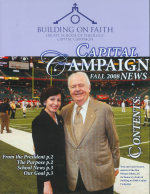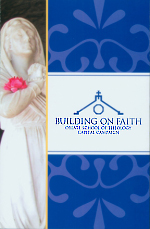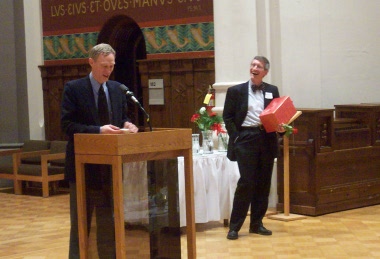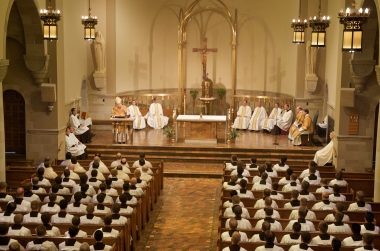Theological schools, like all other institutions in modern society, exist in constantly changing environments. Survival depends on the ability to adapt.
During the last two decades, the greatest changes that theological schools have weathered have been financial. Indeed, a series of reports, published over the last 15 years by the Auburn Center for the Study of Theological Education, documents how decreasing church support, shifting enrollment patterns, and the vicissitudes of the stock market have affected schools' revenues. The good news is that many institutions have proved remarkably adaptable.
There is no universal solution to the financial challenges facing theological schools. In Seek and Find? Revenues in Theological Education, author Anthony Ruger stresses that although there are advantages to pursuing diverse sources of revenue, there is no perfect blend of revenue streams. Different schools have different strengths. But Ruger also predicts that almost all future revenue growth will come from gifts.
This certainly seems to be true of Catholic seminaries. Most have seen their number of priesthood candidates decline over the last few decades. And most have seen a decrease in support from their diocese or sponsoring religious order. And many - the adaptable ones - have turned to fundraising. In doing so, they have learned some valuable lessons.
Decreasing institutional support
 |
| A new capital campaign at Oblate School of Theology was spurred by a gift from New Orleans Saints owner Tom Benson and his wife, Gayle. |
Oblate School of Theology in San Antonio, Texas, is affiliated with Oblates of Mary Immaculate, who founded the school in 1903. For most of its history, the school received support from the Texas province of the order, and later from the order's national organization. In addition to establishing an endowment, the order has been giving about $1 million per year to the school. But in the next 10 years, this support will likely decrease by about $100,000 per year. The order had long planned to phase out its support, but the change also reflects its own decreasing revenue and shrinking endowment. For Oblate School of Theology, this leaves a large hole in its balance sheet that needs to be filled. And Oblate is not alone: According to the Auburn Center, only about 14 percent of the average revenue at Catholic seminaries comes from church support-a percentage that seems likely to decline. Nor is Oblate alone in having to look for a Plan B after a plummeting stock market has made it impossible to use investment income to compensate for the loss of the subsidy. The school's solution? The "Building on Faith" capital campaign.
Oblate has experience in running capital campaigns, having raised roughly $7 million just five years ago for a new library and dormitory. A new capital campaign at Oblate School of Theology was spurred by a gift from New Orleans Saints owner Tom Benson and his wife, Gayle.
According to Father Ronald Rolheiser, an Oblate priest who serves as the school's president, several of the school's constituents helped plan the new campaign. It was a board initiative, intended to raise money for an auditorium and classrooms. The faculty and dean insisted that there should also be money for a new residence hall, while Father Rolheiser added a request for three endowed chairs. The total price tag, including endowments for maintaining the new buildings, came to $15 million.
 |
At that moment, a long-time friend of the school stepped forward. Tom Benson, the owner of the New Orleans Saints football team, gave the school a $15 million challenge grant, raising the campaign's overall goal to $30 million, an amount that would allow for the buildings, the chairs, and a greatly increased permanent endowment. Benson's gift demonstrates the importance of cultivating relationships with potential benefactors. An honorary member of the order-and the husband of one of the school's board members-Benson intended his gift to further the order's work, especially in the southwestern United States.To assist the development office and campaign committee, the school hired a consulting firm, a move that Father Rolheiser recommends to institutions in similar situations, especially those without much fundraising experience. He concedes that he was skeptical whether the benefits would justify the costs until he realized that consultants can conduct feasibility studies and have Rolodexes full of good contacts. Look for firms with experience in your own school's donor community, he advises, and pick an agency committed to your mission.
Board involvement is an essential complement to the work of administrators and consultants. At Oblate, each of the roughly 30 board members plays a role in the campaign. All have made financial contributions; many serve on building or steering committees. Father Rolheiser says that board members are especially helpful in contacting potential donors and in serving as the public face of the institution.
A changing student body
As the number of men seeking ordination to the Catholic priesthood has declined, lay people have stepped in to take their places in many schools of theology. But an increase in lay students has significant effect on a school's income, because lay students typically pay their own way, while the tuition for a candidate for the priesthood is paid by his sponsoring diocese or religious order.
One school that has gone through this transition is the St. John's School of Theology-Seminary in Collegeville, Minnesota. Dr. William J. Cahoy, dean of the School of Theology, notes that dioceses have been slower to support lay students than candidates for ordination, even though lay leaders are increasingly providing services that priests once did- especially religious education and administration. In part this gap in support exists because dioceses have much clearer relationships with candidates for ordination than they do with lay students, but the upshot is that schools often assume the burden of supporting lay students with scholarships, especially if they are committed to helping their graduates avoid heavy debt burdens. Money for scholarships in turn requires fundraising.
 |
| Dr. Dennis Smid, a member of the board of overseers at St. John's School of Theology-Seminary, addresses a group of alumni and friends as Dean William J. Cahoy looks on. |
Because graduates of schools of theology rarely enter highly paid professions, fundraisers must look beyond their immediate communities to find friends and build relationships. Like many schools, St. John's has a development office that has grown increasingly active over the past two decades. But for fundraising to succeed, the board must also take an active role. Cahoy believes that the board's role is essentially networking - helping the school connect to the broader community and expand its circle of friends and benefactors.
Board members can serve as bridges between seminaries and parishes. On the one hand, they can help educate parishes about the importance of seeking and supporting well-formed leaders. But they can also communicate parishes' needs and concerns back to the seminaries. Cahoy advises schools launching into significant fundraising for the first time to seek the advice of friends who have had success in Catholic fundraising. But he also thinks that Catholic development officers should talk to colleagues at Protestant schools, because many Protestant seminaries were forced to adjust to decreases in church funding a generation ago.
Advancing the seminary's mission
Even some Catholic seminaries with strong church support and healthy enrollment have discovered the benefits of cultivating relationships with donors. Kenrick-Glennon Seminary in St. Louis trains candidates for the priesthood exclusively, and the school is enjoying its highest enrollment in 20 years. Moreover, funding from the Archdiocese of St. Louis, most of which comes from the archdiocese's annual appeal, has remained steady over the years. Still, fundraising is an important part of the school's mission.
 |
Kenrick-Glennon Seminary is enjoying its highest enrollment in 20 years.
(Photo by Jeff Geerling) |
Msgr. Ted Wojcicki, Kenrick-Glennon's president-rector, stresses that fundraising is "all about engagement with people." He believes that it involves everyone affiliated with the institution. At Kenrick-Glennon, that engagement takes the form of communication such as a newsletter and regular e-mail updates. But it also includes the priests and seminarians who work in parishes on the weekends. Kenrick-Glennon even sponsors lectures and workshops by faculty and hosts summer camps and an annual auction. Wojcicki says that these practices focus on "bringing people in and sending people out," all in the name of informing the broader public of the seminary's mission.
As at all seminaries, Kenrick-Glennon's board members are an important constituency. Most are benefactors and also participate in long-term planning. They're also ambassadors for the institution, helping to identify bases of support including alumni networks and lay organizations like the Knights of Columbus and Serra clubs. They spread the word about the school's mission and through their testimonies convince others to own it for themselves
Questions for boards
|
|
The board's role
-
In this school's particular setting, what is the board's role in institutional advancement?
-
Who sets development goals? In what way can the board contribute to this process in an appropriate manner?
-
How does the board's role coordinate with fundraising within the diocese or religious order?
-
Are the lines of authority clear and is communication adequate?
Board self-assessment
-
What goals can the board set for itself?
-
What is the role of each board member in institutional advancement, and how are members prepared for their roles?
-
If members are expected to be ambassadors for the institution, what yardsticks can measure success?
-
Do board members know the president's expectations for their participation in fundraising events?
Board governance
-
What does the board need to know about the school's financial structure in order to set realistic fundraising goals and budget allocations for the development office?
-
Does the development staff have the expertise to manage different strategies for fundraising (including planned giving and major gifts)?
-
What strategic indicators should the board watch to understand the school's current fundraising status and monitor fundraising goals?
-
Is the board aware of long-term trends in the school's development history and in the wider church's giving patterns?
|